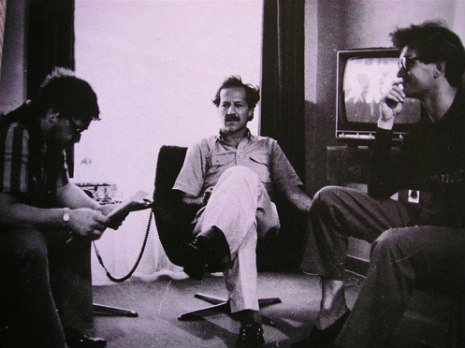
In February 1962, a group of young German film-makers issued a statement at the International Short Film Festival Oberhausen in North Rhine-Westphalia. Called the Oberhausen Manifesto, the declaration stated, “Der alte Film ist tot. Wir glauben an den neuen” (“The old cinema is dead. We believe in the new cinema”):
The decline of conventional German cinema has taken away the economic incentive that imposed a method that, to us, goes against the ideology of film. A new style of film gets the chance to come alive.
Short movies by young German screenwriters, directors, and producers have achieved a number of international festival awards in the last few years and have earned respect from the international critics.
Their accomplishment and success has shown that the future of German films are in the hands of people who speak a new language of film. In Germany, as already in other countries, short film has become an educational and experimental field for feature films. We’re announcing our aspiration to create this new style of film.
Film needs to be more independent. Free from all usual conventions by the industry. Free from control of commercial partners. Free from the dictation of stakeholders.
We have detailed spiritual, structural, and economic ideas about the production of new German cinema. Together we’re willing to take any risk. Conventional film is dead. We believe in the new film.
It was signed by twenty-six film-makers including Alexander Kluge and Edgar Reitz. But it would take until the end of the decade before a more radical and ambitious group of film directors put into practice the aims of the Oberhausen Manifesto.
Volker Schlöndorff, Werner Herzog, Wim Wenders, Hans-Jürgen Syberberg, Jean-Marie Straub and Rainer Werner Fassbinder allied themselves to a New Cinema that dealt with the interests and issues of their generation, and sought to achieve an excellence of creativity, rather than films made for purely commercial reasons.
Schlöndorff, Herzog, Wenders and Fassbinder were to pioneer this New Cinema, and their movies (including The Lost Honor of Katharina Blum, Aguirre, the Wrath of God, The Goalkeeper’s Anxiety of the Penalty Kick, The Merchant of Four Seasons) were to become amongst the most artistically significant of the 1970s.
Signs of Vigorous Life: New German Cinema is a short documentary on the origins of New German Cinema, which features interview footage with Werner Herzog, Wim Wenders, Volker Schlöndorff, and Rainer Werner Fassbinder.
Previously on Dangerous Minds
Rainer Werner Fassbinder died 30 years ago today





